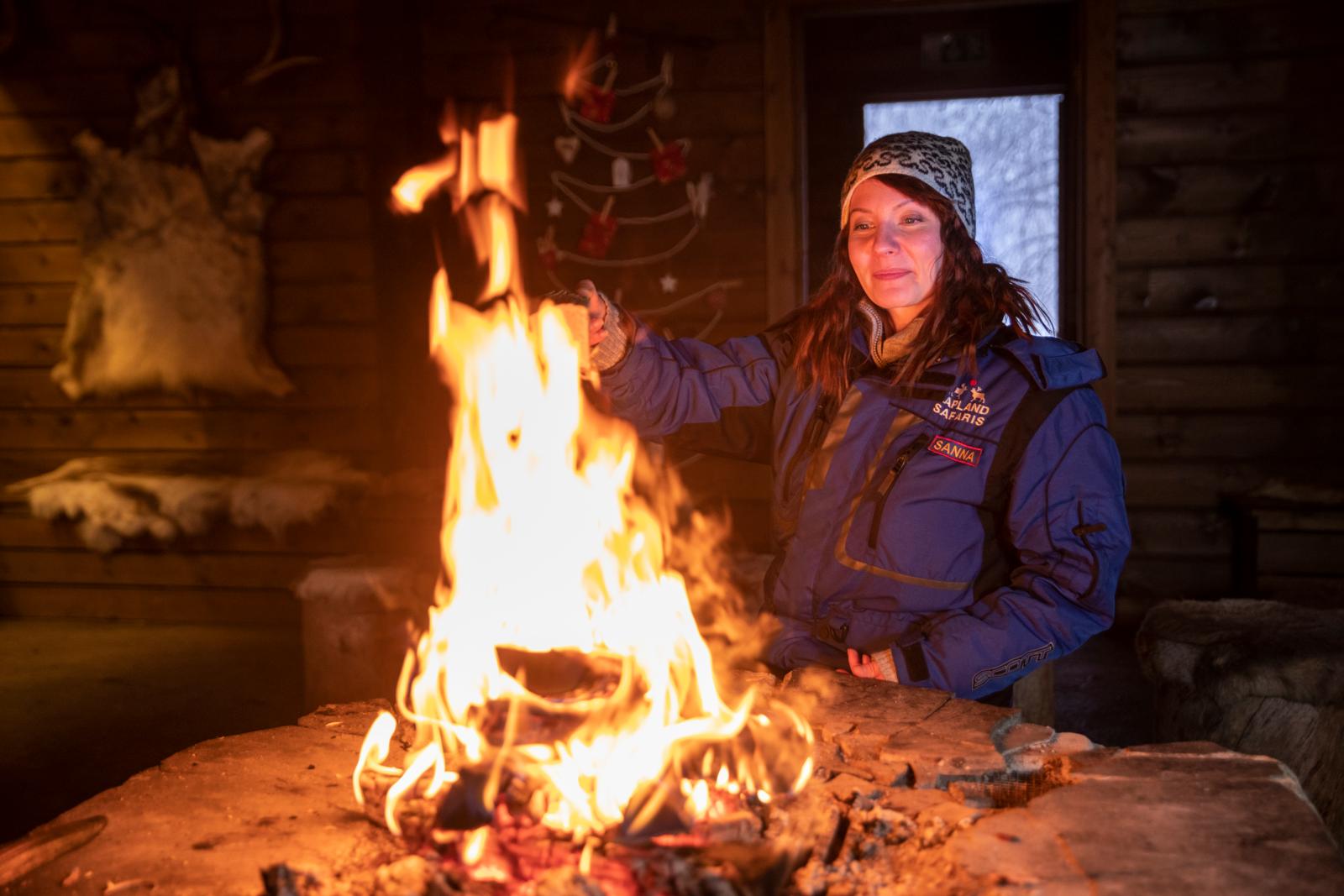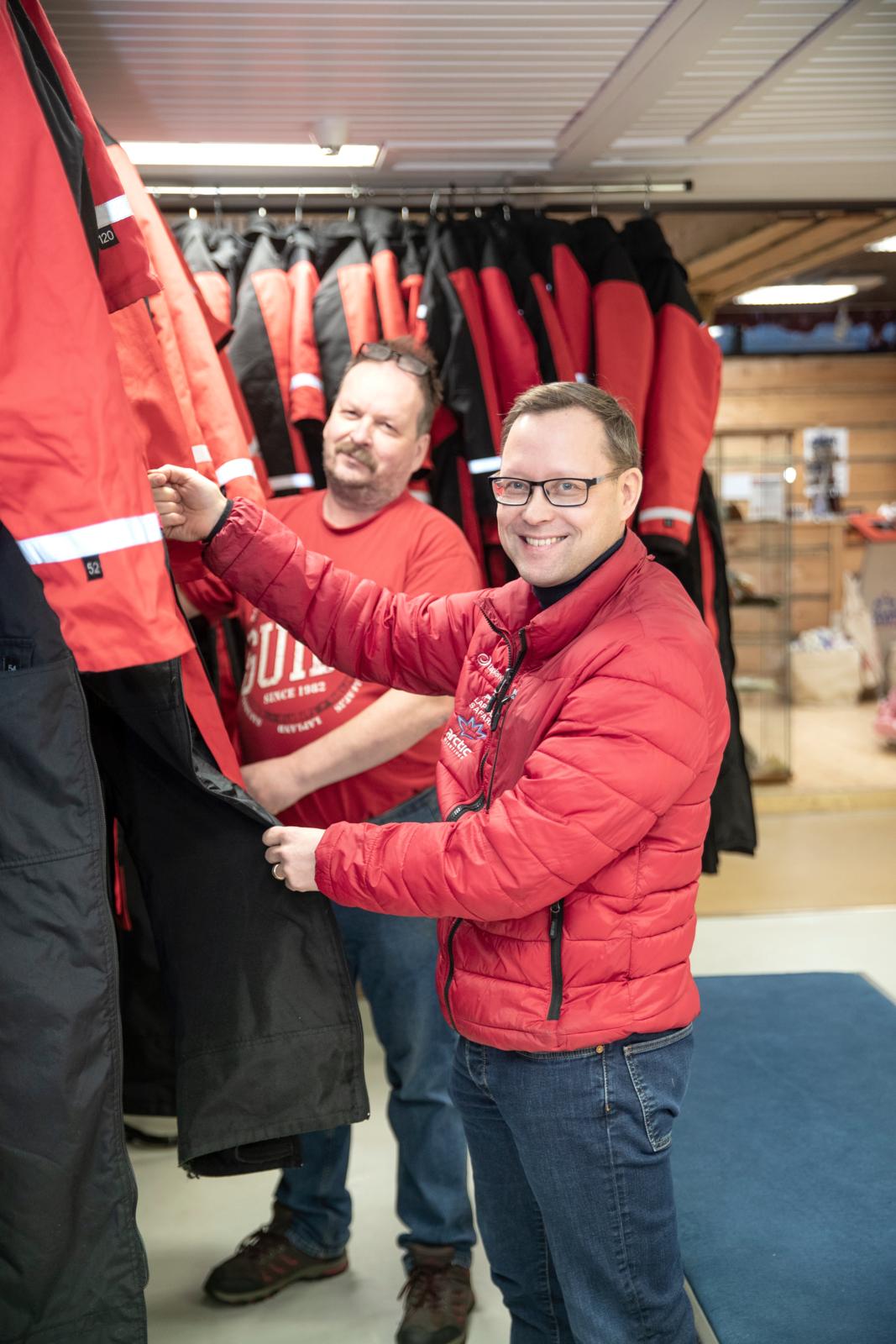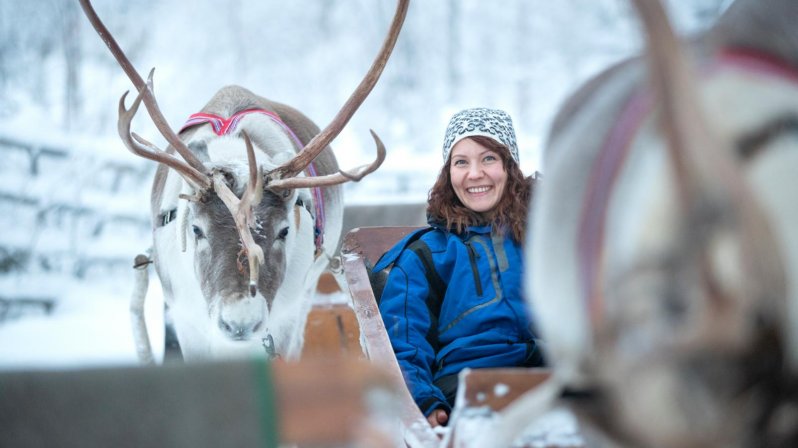Safari companies are more professional but work is still seasonal
Safari guides in Lapland, like Sanna Heinonen, take their foreign clients to reindeer and husky farms or to snowshoe walks. The strongly growing sector has become more professional but is still very seasonal.
The first-season safari guide Sanna Heinonen, 34, works for Lapland Safaris in Rovaniemi. The former sewer and entrepreneur in private childminding graduated last spring in her third profession in tourism.
She is a talkative person which is good; the work of a safari guide is about telling stories and creating that Christmas fairy-tale for tourists flying in on chartered flights. When a safari guide takes her clients on tours, to a reindeer farm to scratch the reindeers, for example, she leads her group at the head of a line of snowmobiles.
"Sometimes I wear thick winter clothing, sometimes an elf costume at work", Heinonen says.

"A stiff person couldn´t do this job", Heinonen says. You also need language skills, as 99% of the customers are foreigners.
In Heinonen´s job, you have to let yourself go and also be flexible.
"You don´t always know in the morning what the evening will bring."
The company has a weekly programme but sometimes extra tours are added during the day or some tours are called off. According to Heinonen, safari guide´s work may come as a shock to somebody who is used to regular working days.
Safari companies are now bigger
Tourism industry has grown in recent years and so have the safari companies. Travellers are looking for experiences and need guides and tours to get them. Many are interested in nature but are afraid of deviating from the road and hitting the wilderness on their own.
PAM´s economist Olli Toivanen has followed the turnover development of approximately 100 safari and experience travel companies.
"Total sales growth from 2016 to 2017 was 20.6% ", Toivanen says.
According to him, this is a sign of a particularly good tourism year 2017. Experience travel is thriving, especially in Lapland.

Chief shop steward Risto Vuento of Lapland Safaris Group expects this season to become another "hyper winter".
"Last winter was already super", Vuento adds.
Rami Korhonen, the Group’s Director of Operations, says that the two-digit sales growth can be explained by rising interest of foreign travellers in Lapland. Lapland is considered safe yet exotic.
The sector has become more professional
Easy-going chief shop steward Vuento has worked in the sector for 25 seasons. During those years he has seen the professionalisation of safari companies – and the events services sector in general.
"In the beginning, we may have had a couple of random tours a week but now we work non-stop during the season. The last tour of the day, to look for Aurora Borealis, finishes at half past midnight", Vuento explains.
"In the beginning, you could find a job by just hanging around and asking for one. Salaries were paid partly in cash; I remember a large group of guides queueing up to the CEO´s office", Vuento tells.
Director Rami Korhonen names another sign of professionalisation: a large number of new regulatory provisions on documentation and safety at work which have been everyday life in many older sectors for a long time already.
Another new phenomenon is sharing economy, well known in tourism in general. Private individuals are offering tours to tourists on the same platforms where they sell AirBnB accommodation, for example. When they work outside official control, there is a growing worry of double standard operations.
Away from zero-hours contracts
Staff shortages in Lapland tourism industry have recently hit the headlines. Lapland Safaris has reacted by improving its employees’ working conditions.
Guaranteed working hours, instead of zero-hours contracts, are this season´s novelty at Lapland Safaris. The employees also know their days off well in advance. And, showing the way to other similar companies, the Group introduced already last season locally agreed allowances for evening and night work.
Risto Vuento believes that the best way to improve the position of seasonal safari workers in Lapland is to offer year-round work and employment relationships.
"There is not much summer tourism yet, with the emphasis on the word ‘yet’. It will come", Vuento foresees.
Rami Korhonen says that Lapland Safaris received a lot of job applications this season. Already more than half of the applicants are foreigners.
"We are seen as an exotic place to work in the tourism industry. We now receive more job applications than restaurants", Korhonen estimates.
This employer is an exemplary one but there are different stories on the working conditions of safari workers as well.
Subcontracting services is common
The tourism season in Lapland stretches from end November to mid April but the peak season is surprisingly short:
"Half of our annual turnover is generated in December", Korhonen confirms.
Seasonalness is also seen in the number of employees. In December, the company employs 650 people but only 70 people are employed year-round. Experience tours to tourists are created in cooperation with other operators, meaning that work is offered also to neighbouring companies. When a Lapland Safaris guide takes a tourist group to see huskys or reindeers, the animal farms operate as individual companies.
"Subcontracted services make up 40% of our turnover", Korhonen says.
At the end of the season, a seasonal worker packs her bags. Sanna Heinonen comes from Pyhäjoki, south of Oulu. Her season in Rovaniemi lasts for five months. For summer, the mother of one plans to apply for another seasonal job.
"Last year I worked as a climbing guide in an adventure park, and I might look for a similar job for next summer as well."
Adventure services is an important sector
The adventure services collective agreement between PAM and the employer organisation MaRa is applied to safari and wilderness guides. This is the reason why, in the union, safari companies are usually called events services sector.
In general, the term events services cover a large variety of services aimed at travellers. They may include skiing resorts, golf courses, amusement and theme parks, other recreational activities, animal parks, saunas and solariums, among others.
"The share of events services of the total sales of the tourism core cluster is 28% whereas the share of accommodation is 17% and that of restaurant services 55%”, Susanna Jänkälä, Sector Manager of Tourism in the Ministry of Economic Affairs and Employment says.
In Jänkälä’s opinion, events services are important for tourism. A tourist doesn’t come to Finland just to be accommodated, he’s looking for experiences. In particular, nature-based tourism is growing. In that sector, foreign tourists use events services very differently from Finns.
"Finns can go for a forest walk on their own, whereas to somebody coming from another culture even a short trip into nature must be branded as an events service."
In 2017, 6,300 companies and 11,800 employees worked in tourism-related services. The figures had grown a little compared to 2016. Total sales were 2.7 billion euros compared to 2.6 billion the year before.
According to Visit Finland, foreign travellers had 6% more overnight stays in Finland than the year before. In Lapland, the growth rate was 10.5%.



